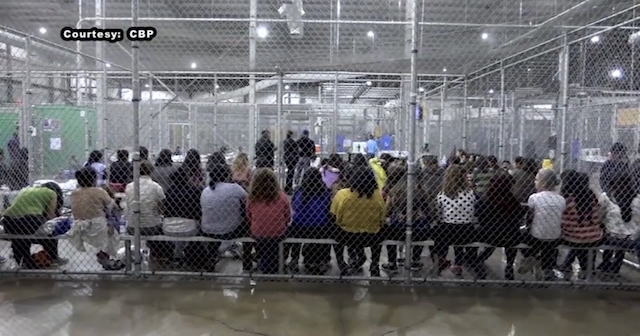This has to be a joke!!!! These foreign invaders ILLEGALLY enter America and then COMPLAIN and SUE because they weren’t treated as visiting royalty??????
What kind of court even allows such a case to be filed???
The ILLEGALS are the CAUSE of the *OVERCROWDING*. All they have to do to alleviate that *problem* is to stay in their home and not invade our country. No need to SUE to relieve the *overcrowding* they have caused. DHS should file counter suit against them for creating the overcrowding. ~ Granny
 According to new reports, a group of seven illegal aliens are suing the Department of Homeland Security due to conditions in Border Patrol detention facilities.
According to new reports, a group of seven illegal aliens are suing the Department of Homeland Security due to conditions in Border Patrol detention facilities.
The migrants also claim to have not been given access to adequate legal representation, and allege that the conditions in the overcrowded facilities are “dangerous and inhumane.”
Now, the illegals are suing, claiming they want to be released on bond.
Over the past several months, illegal immigration at the US-Mexico border has surged dramatically, prompting law enforcement officials to repeatedly seek help from lawmakers.
The crisis along America’s southern border has continued to exasperate Border Patrol agents in the field and President Donald Trump, who is attempting to put an end to the flood of illegal aliens. Seven illegal aliens from Central American countries are suing the Department of Homeland Security because of overcrowding in Border Patrol facilities and the lack of access to legal representation, The Monitor reported.
The lawsuit was brought about by:
• Jairo Alexander Gonzalez Recinos – El Salvador
• Gerardo Henrique Herrera Rivera – El Salvador
• Kevin Eduardo Rizzo Ruano – Guatemala
• Jonathan Fernando Beltran Rizzo – Guatemala
• Enerly Melitza Ramos – Guatemala
• Karen Vanessa Borjas Zuniga – Honduras
• Julia Elizabeth Molina Lopez – Honduras
According to the lawsuit, the illegal aliens want themselves, as well as others in the facilities, to be released on bond.
“Petitioners were apprehended in mid-May at or near the U.S. Border with Mexico and subsequently detained. Once apprehended, such persons are often detained for extended periods of time — on information and belief, up to six weeks — in overcrowded holding cells, with inadequate food, water, and sanitation facilities, where attorneys are not allowed to visit. The conditions in these holding cells are dangerous and inhumane,” the lawsuit stated.
The number of illegal aliens flocking to the United States’ southern border has overwhelmed Border Patrol resources. Instead of seeking asylum, like they have long touted, illegal aliens, primarily from Central America, now look for a Border Patrol agent, say they want to see an immigration judge and turn themselves in. They do this because they know of catch-and-release. They know the number of people flocking to the southern border has overwhelmed America’s immigration system. Border Patrol agents are having to leave the actual border to help process those who have simply walked across the border.
The lawsuit claimed the seven illegal aliens were detained at the Brownsville, Texas facility for more than five days and, during that time period, they were treated inhumanely. One of the biggest issues is the inhumane conditions. Most of the facilities are short-term processing and holding centers, meaning they don’t have showers, beds or adequate bathroom facilities. The illegal aliens have now coined the facilities as “hieleras,” the Spanish word for freezers, because the facilities are small, concrete facilities with metal benches.
The conditions are something that Border Patrol agents have continually brought up. It was also one of the driving forces behind the immigration crisis in Murrieta, California back in 2014, where illegal aliens were being flown in from Texas and dumped at a short-term drug processing facility.
The lawsuit also stated that detainees were receiving one sandwich a day and haven’t showered during their entire incarceration. Some have been held as long as 40 days.
“They have been packed into overcrowded facilities and detained for weeks without adequate food and water, sanitation facilities, or access to counsel,” one lawsuit stated. “Attorneys are not allowed to visit individuals detained at these facilities, so counsel have been unable to communicate directly with them, or obtain their signatures on G-28s, the forms required for counsel to be recognized as their attorneys by DHS.”
The argument being made is that the illegal aliens have failed to receive basic necessities so they’ve signed away their rights without knowing what exactly it is they’re signing.

We no gotta show you no Steenkin’ papers!
“Some detainees at these facilities have been so deprived of basic necessities that they have signed documents, the contents of which they are unaware, (but which most likely waive their rights under the Immigration and Nationality Act), involuntarily, and without adequate screening regarding their fears of returning to their native countries and means of learning about potential lawful means of avoiding prompt removal,” the lawsuit stated. “Class members are unable to receive visits from legal counsel, are detained without adequate food, water, sleeping and sanitation facilities, and are often forced or coerced into signing documents, the contents of which they may be unaware, but which may relate to their voluntary departure or removal from the United States.”
The attorneys in the case want a federal judge to place an injunction against Border Patrol. If the judge agrees, the federal agency would have to release anyone who has been held more than 72 hours, even if they don’t have an electronic monitoring device.
FAIR USE NOTICE: This site contains copyrighted material the use of which has not always been specifically authorized by the copyright owner. We are making such material available in our efforts to advance understanding of environmental, political, human rights, economic, democracy, scientific, and social justice issues, etc. We believe this constitutes a ‘fair use’ of any such copyrighted material as provided for in section 107 of the US Copyright Law. In accordance with Title 17 U. S. C. Section 107, the material on this site is distributed without profit to those who have expressed a prior interest in receiving the included information for research and educational purposes. For more information go to: http://www.law.cornell.edu/uscode/17/107.shtml
